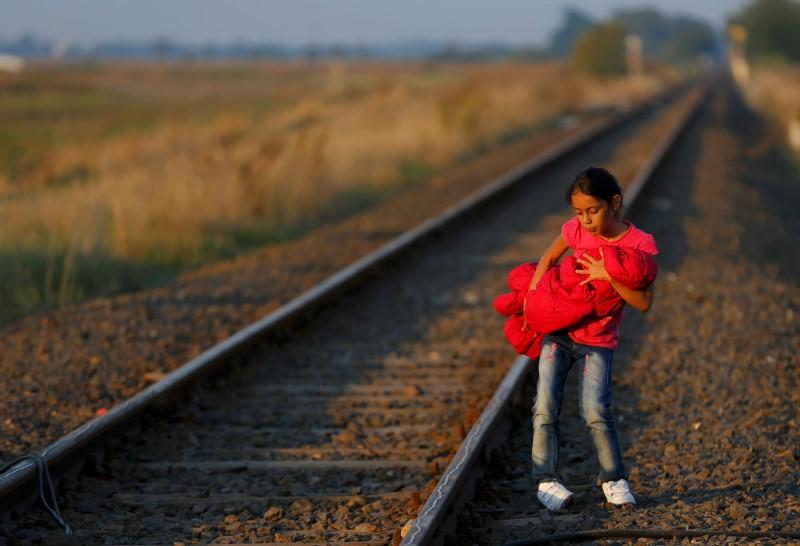Schengen: Europe’s open borders in question

Germany's reimposition of border controls with Austria on Sunday has brought home the risks the summer refugee crisis poses to Europe's system of open frontiers, commonly known as "Schengen".
The Luxembourg village on the Moselle where old enemies France and Germany meet gave its name 30 years ago to the code which removed border checks between most European states. But hundreds of thousands of people arriving on the bloc's external borders claiming asylum, and discord among governments over where to put them, has exposed weaknesses in the Schengen ideal.
The European Commission, the executive of the European Union which enforces the rules on 26 states including four non-EU members, has ruled out major change. It describes Schengen as one of the greatest achievements of the postwar peace, a boon for citizens and non-European visitors, as well as for business.
Commission President Jean-Claude Juncker, informed by German Chancellor Angela Merkel of Sunday's move, was quick to issue a statement saying Berlin was not breaking Schengen rules. These permit renewed frontier controls as a "last resort" where there is "a serious threat to public policy or internal security".
Such exemptions are subject to EU review and varying time limits, ranging from 10 days to, very exceptionally, two years.
The root of the problem lies less at the internal borders than at the bloc's external frontiers and with another town inscribed in the EU's statutes – Dublin. (With a touch of irony, Ireland, like Britain, has stayed out of the Schengen zone.)
A system first agreed in Dublin in 1990 means that people requesting asylum must be housed and have their claims processed in the state in which they first arrived in the EU. A surge in arrivals by sea has left Italy and Greece struggling. Chaos in Greece means many move on across the Balkans to reach Hungary.
When European leaders, including Merkel herself, have raised alarms about the future of Schengen, many hear it as a veiled threat aimed at eastern Europeans who oppose German-backed EU proposals to rework the Dublin system and force member states far from the frontlines to take in a share of refugees.
Dublin vs Schengen
In principle, someone who claims asylum in Germany but has entered the EU in Italy, should be sent back there. Even if granted refugee status in Italy, they would be unable to move to Germany for five years. Germany last month said it would not deport Syrians to other EU states, suspending Dublin for them.
That in turn fueled problems in Hungary, where many people refused to register for asylum and demanded to continue journeys to Germany. Hungary faces an additional complication since, even though most of those arriving via Serbia first entered the EU in Greece, EU judges have banned deportations to Greece under the Dublin rules on the grounds accommodation there is inadequate.
Accepting Dublin must be fixed to spread the load, Juncker proposes sending 160,000 asylum-seekers from Italy, Greece and Hungary around the EU according to national quotas. But bitter arguments are still holding that up before a crunch meeting of EU interior ministers in Brussels on Monday.
Meanwhile Greece and Italy have long resorted to DIY methods to relieve the pressure, simply letting migrants head north.
That has seen France lately step up checks near its Italian border, Danes closing their German frontier last week, Austrian police mounting operations on roads from Hungary and, on Sunday, Germany's move to clamp down on traffic at its Austrian border.
If such procedures continue to spread and endure, officials fear they could undermine Schengen's principles of free transit.
As Juncker's chief-of-staff tweeted on Sunday: "Schengen will be in danger if EU member states don't work together swiftly and with solidarity on managing the refugee crisis."
There is a element of political pressure in such remarks, with Merkel and other backers of the Juncker plan well aware that voters in the poorer, formerly Communist east are among the biggest beneficiaries and supporters of Schengen's freedoms.
As yet, there appears little appetite among governments to undertake the cost and disruption of redeploying frontier police on a long-term basis to make routine document checks to intercept the few thousands of migrants, among the millions traveling every day, who are not entitled to move country.
Businesses, particularly in road transport, have raised an alarm about a reimposition of passport checks on truck drivers and others engaged in cross-border activity.
But Schengen has come under attack from some who argue that it has made life easier for criminals, including the suspected Moroccan Islamist accused of attacking an international train from Amsterdam via Brussels to Paris last month.
The Commission says the Schengen code, which also regulates the sharing of visa data and criminal intelligence, gives states sufficient powers to carry out both security and identity checks where these can be justified. Germany already reimposed frontier checks this year, while it was hosting the G7 summit in June.
Were a country to impose routine identity checks at its borders, on roads or at airports and rail stations, it would face legal action by the Commission. In practice though, some fear it could start a snowball effect that the EU might struggle to halt – even if checks might be likely to remain patchy, with governments wary of cost and a public backlash at inconvenience.
[Reuters]





